Tibia
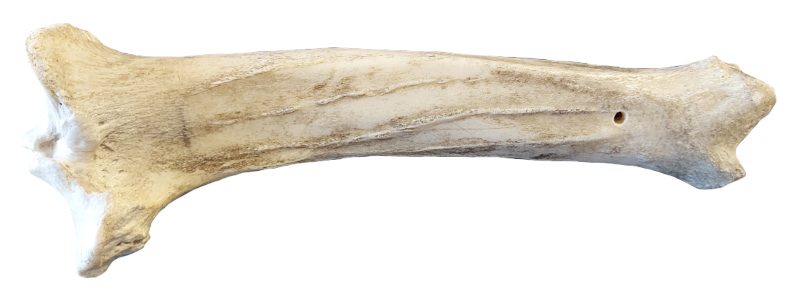
Elements where the proximal and/or distal epiphyses are un-fused and not with the specimen are coded as though the epiphyses are missing.
Elements where the proximal or distal epiphyses are un-fused but are present during coding, the un-fused epiphyses are grouped together for coding and cataloguing and are not counted as separated pieces.
For an un-fused epiphysis unassociated with the rest of the element it is assigned an appropriate BU number.
For the Fincastle Project, Bone Units 30, 31, 32, 33, 34 and 35 were added.
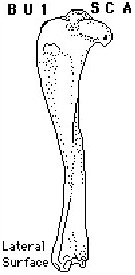
BU 1
SC A
Complete element.
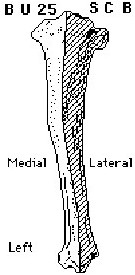
BU 25
SC B
Unit consists of medial half of element, split sagittally. (WU)

BU 26
SC C
Unit consists of lateral half of the element only, split along the sagittal plane. (WU)
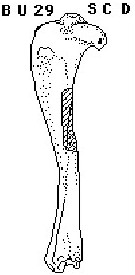
BU 29
SC D
Unit is the opposite of BU 5 and BU 6. The element is essentially complete except for a missing section of the posterior shaft characterized by muscle scar on the bone surface. The nutrient foramen may or may not be present. (WU)
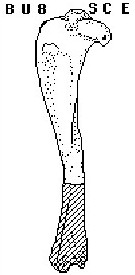
BU 8
SC E
Complete proximal end with from ½ - ¾ of adjoining shaft length represented.
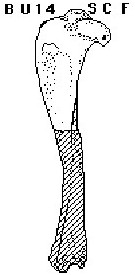
BU 14
SC F
Complete proximal end with from ¼ - ½ of adjoining shaft length represented.
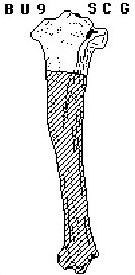
BU 9
SC G
Complete proximal end with from 0 – ¼ of proximal shaft length represented.
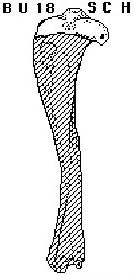
BU 18
SC H
Unfused proximal end detached and not associated with rest of element. Code condition as ‘weathered’.
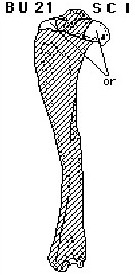
BU 21
SC I
Fragment of unfused, proximal epiphyses. Similar to BU 18. Code ‘condition as weathered’. (TH)
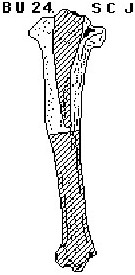
BU 24
SC J
Complete proximal end of tibia and up to ½ adjoining shaft, missing all of the crest (missing BU 13 from proximal end.) (GL)
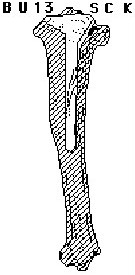
BU 13
SC K
Essentially complete crest of tibia (proximal and distal portions) and immediately adjacent portion of medial condyle. Similar to BU 2, BU 3 and BU 11.
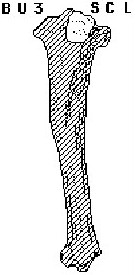
BU 3
SC L
Proximal and sometimes medial portion of crest of tibia with immediately adjacent portion of medial condyle.
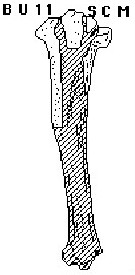
BU 11
SC M
Shattered proximal end. Consists of fragments of proximal end broken into two or more pieces of various sizes and configurations. Varying amounts of adjoining shaft represented although 0 – 1/4 of shaft length most common. Frequency indicates minimum number of elements represented by BU 11. Does not include pieces included under BU 3. For Oldman project, frequency indicates number of pieces only.

BU 12
SC N
Not a bone unit. Frequency indicates number of pieces constituting BU 11. Not coded for the Oldman project.
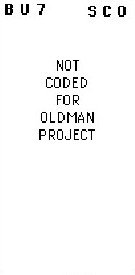
BU 7
SC O
Not a bone unit. Frequency indicates minimum number of elements represented by fragments from proximal end. This observation made since many proximal end fragments not analyzed due to extensive carnivore gnawing. Not coded for the Oldman project.
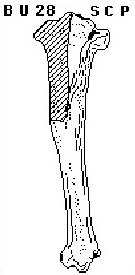
BU 28
SC P
Unit is missing medial or lateral half of the proximal end of shaft and articular end. (SB)
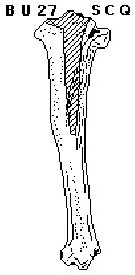
BU 27
SC Q
Unit consists of essentially complete element, with the exception of a missing anterior crest. Opposite of BU 13 and similar to BU 24, except the shaft of the bone is complete. (WU)
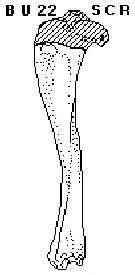
BU 22
SC R
Element with none of proximal end and 0 – 1/4 of proximal end of shaft removed. (KK)
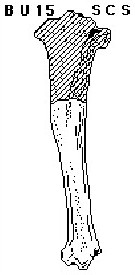
BU 15
SC S
Complete distal end with from 1/2 – 3/4 of shaft represented.
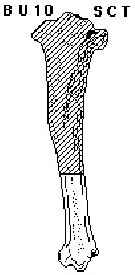
BU 10
SC T
Complete distal end with from 1/4 – 1/2 of adjoining shaft length represented.
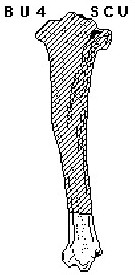
BU 4
SC U
Complete distal end of tibia with 0 – 1/4 of adjoining shaft present.
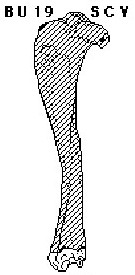
BU 19
SC V
Un-fused distal end detached and not associated with rest of element. Code condition as weathered.
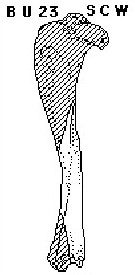
BU 23
SC W
Distal anterior portion of tibia with 1/4 – 1/2 adjoining shaft; posterior distal portion of the tibia is missing.
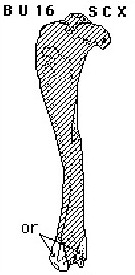
BU 16
SC X
Shattered distal end. Consists of fragments of the distal end broken into two or more pieces of various sizes and configuration. Varying amounts of adjoining shaft represented. Usually no more than 1/4 of total shaft length present. Frequency indicates minimum number of elements represented. For Oldman project, frequency indicates number of pieces only.
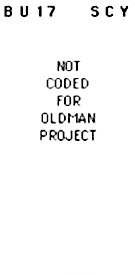
BU 17
SC Y
Not a bone unit. Frequency indicates minimum number of elements represented by BU 16. Not coded for Oldman project.
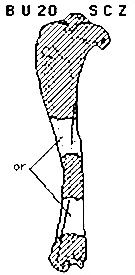
BU 20
SC Z
Tube-like sections of tibia shaft with all of proximal and distal ends totally missing. Bone unit may vary considerably in portion of shaft represented. (AL)
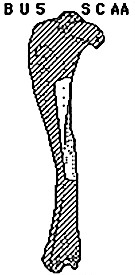
BU 5
SC AA
Section of posterior shaft surface characterized by nutrient foramen and commonly muscular lines situated on posterior surface. Similar to BU 6.
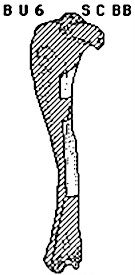
BU 6
SC BB
Same as BU 5 except nutrient foramen absent. Frequency indicates number of pieces represented by BU 6 and not number of elements.
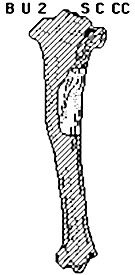
BU 2
SC CC
Consists of distal end of crest of tibia. Never includes proximal end of crest with immediately adjoining portion of medial condyle. Small to large portion of adjoining shaft may be present.
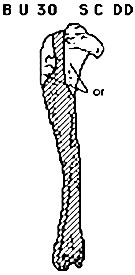
BU 30
SC DD
Proximal pieces, broken in various sizes with 0 – 1/4 of shaft present.
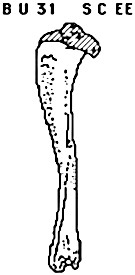
BU 31
SC EE
Complete juvenile, missing proximal epiphysis only.
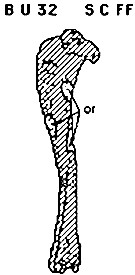
BU 32
SC FF
Small bone fragment of tibia characterized by shape or muscular grooves present on shaft.
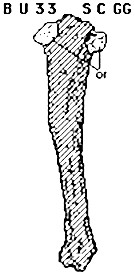
BU 33
SC GG
Portion of medial or lateral condyle of epiphysis.
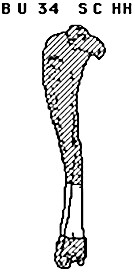
BU 34
SC HH
Distal portion of shaft with distal epiphysis missing (juvenile).
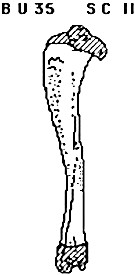
BU 35
SC II
Missing both the proximal and distal epiphyses (juvenile). (SB)